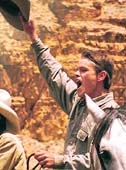
Movie Guru Rating:

Comment
on this review
| |

All the Pretty Horses rides the book's outline but stumbles over its spirit
by Zak Weisfeld
Two boys, 16 years old, saddle their horses in the middle of the night and ride out of their Texas childhood and into Mexico—in search of a cowboy fantasy and a vanished way of life. To their eventual dismay, they find both. This is the premise of formerly-local writer Cormac McCarthy's National Book Award-winning All the Pretty Horses. It's a book that's well worth one's time—and a movie that's not, though not for want of trying.
Director Billy Bob Thornton (best known for his writer/director/star tour de force Sling Blade) is clearly respectful of McCarthy's work. The movie follows the two boys, John Grady Cole and Lacey Rawlins, from their homes on West Texas ranches down across the Rio Grande. He faithfully records their difficult encounter with a young Huck Finn gone bad, Jimmy Blevins, and their eventual arrival on a vast cattle ranch in the high planes of Central Mexico. There, Cole's uncanny affinity for equine kind gets the attention of the ranch's owner, a powerful Mexican businessman, and the businessman's daughter.
Needless to say, things go badly for John Grady, Lacey Rawlins and their young semi-sidekick Blevins. Thornton dutifully puts McCarthy's characters through their paces. There are prisons, firing squads, knife fights, shoot-outs, portentous speeches and hair-raising escapes—each scene played out on screen with the literalness and sincerity of a junior high book report. And all in just over two hours.
The fact of the movie's length has been a major bone of contention between Thornton and the studio. Thornton's original cut of the film is supposed to have been closer to four hours, which would certainly have given it a pace more like the laconic, cowboy feeling of the book. But to say that All the Pretty Horses, the movie, would be a great piece of cinema if only it were two hours longer is to miss the point of why, exactly, it fails in the first place.
The problem, in its essence, is that Thornton has not made a movie called All the Pretty Horses, he has made a cinematic summary of a book called All the Pretty Horses. Thornton's direction is stiff; his vision of the All the Pretty Horses world is riddled with an unfortunate cleanliness—a cleanliness that infects everything from the staging of the scenes to the prison cells to John Grady Cole's hat. Gone is the hallucinatory violence, the surreal landscape and the mythical tone. Instead, Thornton puts the pieces of the book together with the zeal of a fundamentalist—bones, meat, skin; he demonstrates valiant loyalty to McCarthy's dialogue, but there is no messy life to the thing. It's as though Thornton forgot to inscribe the mark on its forehead. His golem will not rise up. In his desire to stay true to the letter of Horses, Thornton has lost sight (if he ever had it) of the spirit.
And, unfortunately for Thornton, his cast is almost no help in disguising the weaknesses of his approach to the material. Matt Damon stands in as John Grady Cole, but is too old and too laid back to do justice to the intensity of Cole's character. Instead of fierce romanticism and indomitable spirit we get Damon's easy smile and charming intelligence. It's a look that seems to shake off the horrors that beset Cole as easily as last semester's break-up.
But far, far worse than Damon is Penelope Cruz, who should be taken out and shot for her role as Alejandra, the daughter of the wealthy ranch owner. Cruz gives nothing to the part but good posture and smug indifference. And the lack of chemistry between her and Damon turns the film's central love story into a dull, chilling joke.
The one truly bright spot is Lucas Black's plunge into the part of Blevins. With a deadpan delivery and a wild grin, Black brings a heart and intensity to the tragic farce of Blevins' short life that puts his Academy Award-nominated elders to shame.
Despite its glaring shortcomings, though, it's difficult to be too unhappy with Thornton's work. Adaptation is a perilous business, but it's especially dangerous with a book as difficult, and as magical, as All the Pretty Horses. And Horses, the movie, isn't terrible, just profoundly mediocre. The worst that can be said about Thornton's take is not just that it reveals his own conservatism and inexperience as a director, but that it reveals the weaknesses of McCarthy's book.
Stripped of McCarthy's soaring prose style, All the Pretty Horses feels unpleasantly like a standard coming-of-age melodrama set against a cowboy backdrop. What Horses needed was not a literalist like Thornton, but a visionary—someone to make the material his own and Cormac McCarthy be damned. As the credits rolled I found myself wondering what a Coppola or a David O. Russell would have done with the material. But mostly I just wished Sam Peckinpah could come back from the dead.

January 11, 2001 * Vol. 11, No. 2
© 2000 Metro Pulse
|





